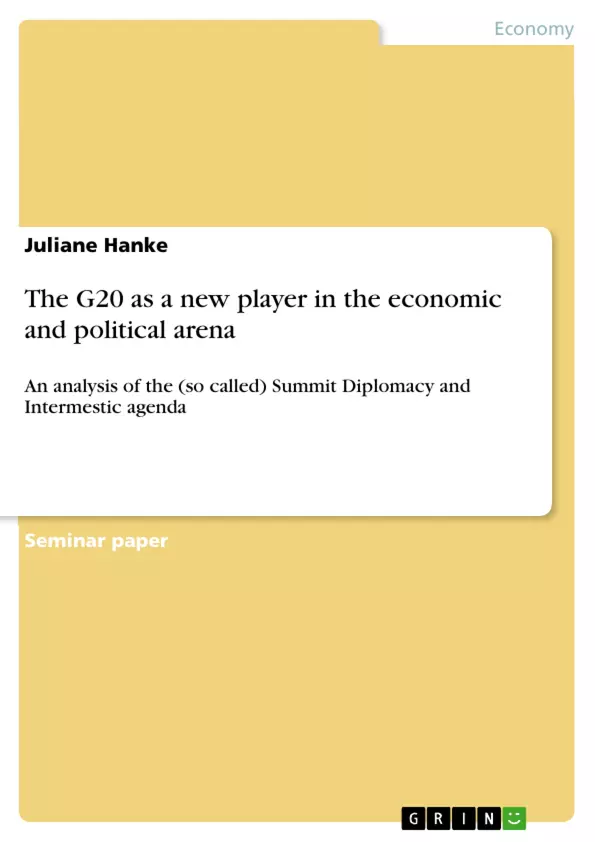At the beginning of this seminar paper, a background of the G20 with a brief historical and technical explanation of the group will be given followed by a chapter on the emergence of the group several years after its formation. The groups’ distinctive summit diplomacy will be explained before examining more closely the G20 agenda and its topics and outcomes. A critical reflection on the G20 will subsequently be expounded before giving a conclusion on the principal results.
In the wake of the financial crisis in 2008, the G20 has developed to a primary multilateral forum. The G20 comprising developing, emerging and developed member countries is reflecting the new dynamics in global politics. The constellation of membership gives the G20 a greater representativeness than other groups and organizations. Filling the governance gap during the financial crisis, the group has proven itself as successfully acting as crisis committee when managing the global financial and economic crisis.
Integral characteristics of its working framework are the “summit diplomacy” and the agenda politic. Its summits as part of a new diplomacy aim to reach a consensus within an informal forum instead of forcing a binding agreement in a formal forum . The G20 agenda has broadened over the years of its existence. From focusing on financial regulation in the course of the financial crisis, the group widened its agenda ranging from economic growth, trade to climate change. The transformation process of turning from a crisis committee into a permanent steering committee has revealed several issues and critics the G20 has to confront with.
Inhaltsverzeichnis (Table of Contents)
- Introduction
- Background of the G20
- The formation of the G20
- Development of the group since 2008
- The G20 summits
- Summit diplomacy
- Agenda topics and outcomes
- Managing the financial crisis
- Reforming institutional organizations
- Targeting economic growth
- Critical reflections on the group
- Conclusion
Zielsetzung und Themenschwerpunkte (Objectives and Key Themes)
This seminar paper examines the G20 as a primary multilateral forum that has emerged in the wake of the financial crisis of 2008. It explores the G20's formation, development, summit diplomacy, agenda topics, and critical reflections on its role and effectiveness.
- The rise of the G20 as a global economic and political player.
- The role of summit diplomacy in achieving consensus among diverse member states.
- The evolution of the G20 agenda from crisis management to broader economic and political issues.
- The impact of the G20 on global governance and its relationship with existing international institutions.
- Critical perspectives on the G20's effectiveness, legitimacy, and influence.
Zusammenfassung der Kapitel (Chapter Summaries)
- Introduction: This chapter introduces the G20 as a key multilateral forum that has gained significance following the 2008 financial crisis. It highlights the G20's representative nature, its role in filling governance gaps, and its distinctive approach to summit diplomacy and agenda politics.
- Background of the G20: This section delves into the origins and formation of the G20, emphasizing its origins within the G8 framework and its initial purpose as a platform for informal dialogue. It outlines the group's structure, membership, and the significance of its rotating presidency.
- The G20 summits: This chapter explores the G20's distinctive summit diplomacy, characterized by its informal nature and pursuit of consensus rather than binding agreements. It examines the key agenda topics and outcomes of the summits, including managing the financial crisis, reforming international institutions, and promoting economic growth.
- Critical reflections on the group: This section presents critical perspectives on the G20, highlighting potential challenges and areas for improvement, such as the group's effectiveness, legitimacy, and ability to balance national and global interests.
Schlüsselwörter (Keywords)
The paper focuses on key terms such as global governance, multilateralism, summit diplomacy, economic cooperation, financial crisis, G20 agenda, intermestic agenda, and critical perspectives on international organizations.
Frequently Asked Questions
When did the G20 become a primary multilateral forum?
The G20 emerged as a primary forum in the wake of the 2008 global financial crisis, filling the governance gap left by other international organizations.
What is "summit diplomacy" in the context of the G20?
It refers to a new form of diplomacy aimed at reaching consensus within an informal forum rather than through binding formal agreements.
How has the G20 agenda evolved over the years?
Initially focused on financial regulation, the agenda has broadened to include economic growth, trade, climate change, and institutional reform.
Why is the G20 considered more representative than the G8?
The G20 includes developing, emerging, and developed countries, reflecting the new dynamics and power shifts in global politics.
What are the main criticisms of the G20?
Critics question the group's legitimacy, its effectiveness in balancing national versus global interests, and its ability to act as a permanent steering committee.
- Quote paper
- Juliane Hanke (Author), 2014, The G20 as a new player in the economic and political arena, Munich, GRIN Verlag, https://www.grin.com/document/503582



